Updated 8/5/2022: The figures showing Home Rates at dialysis day 90 and hospitalization rates did not reflect the findings in the study. The figures have been updated with the correct information.
Kidney care is complex, especially for newer kidney disease patients. Hospital admissions, infections, and other negative outcomes are common in a patient’s first few months of dialysis treatment while patients are learning how to adjust their day-to-day lifestyles to maintain their overall kidney health. Proper education is important for these patients, especially as the amount of information can feel overwhelming for some. A recently published paper by DaVita Clinical Research (DCR) in Kidney Medicine Journal shows that individuals who attend a kidney education program (Kidney Smart) prior to dialysis start are associated with having better health outcomes than similar patients who do not attend one.
For 10 years, Kidney Smart has provided a robust, no-cost education focused on chronic kidney disease (CKD) to patients and their families. Participants can sign up for a 90-minute CKD education class, either in-person, telephonically, or virtually. The Kidney Smart® education program was designed to help people who have kidney disease but are not yet experiencing kidney failure. Patients can attend the class as many times as they want or need. Additionally, they can also sign up for further education focused on treatment options, including home dialysis.
“So many people who attend Kidney Smart classes are seeking additional information about their kidney disease,” explains Francesca Tentori, MD, Vice President of DCR clinical outcomes. “The program is designed to provide a better understanding of what the kidneys do, information to help manage kidney health, understand the treatment options if kidneys fail, and how to work with your doctors to make informed decisions about your health.
DCR’s study compared primary health outcomes for 2,398 individuals who attended Kidney Smart to pair-matched control patients who did not receive CKD education before starting dialysis. The comparison showed that 39% of individuals who attended Kidney Smart classes were likely to choose a home dialysis treatment option as compared with 13% of people who did not attend Kidney Smart. Attendees were also associated with a higher likelihood of using a permanent vascular access at dialysis start — which is associated with a lower infection rate — and lower rates of hospitalization and mortality in the first year of dialysis.
“This study shows why engaging patients with kidney education prior to dialysis start can help them participate in their own health and help them to better manage their overall well-being.” explains Dr. Tentori.
Arlene Valdivia, a Kidney Smart educator, has been helping educate people with CKD for eight years. A director in her region recommended Valdivia become a Kidney Smart instructor after hearing how she helped to make Spanish-speaking dialysis patients more comfortable. Valdivia understood that for many individuals facing kidney disease language barriers can create additional uncertainty.
“I didn’t know what I was getting myself into, but I’m definitely glad I did,” Valdivia says. Now Valdivia’s primary role is leading Spanish-language Kidney Smart classes.
Valdivia explains that Kidney Smart is more than just providing information—it’s connecting with patients, hearing their stories, and providing them the tools they need to manage their health.
Many times Valdivia and other Kidney Smart educators connect with individuals newly diagnosed with kidney disease and their loved ones. The lack of knowledge and the news that they have a chronic disease to manage can come with a lot of doubt and uncertainty. Valdivia explains that part of her job is dispelling myths and reassuring the patients with information about transplantation, dialysis treatments, lifestyle management, and that many people with kidney disease are able to live long lives.
“Once we address that doubt,” Valdivia goes on, “we can start talking about treatment options and how we’re going to handle what’s in front of them.”
By meeting patients and their loved ones where they are—whether that means providing education in their native languages, taking time to understand different cultures, or providing information in a variety of ways—Kidney Smart is showing how kidney education can have a significant impact on kidney health management.
Learn more about the DCR study and the findings associated with Kidney Smart on KidneyMedicineJournal.org.
About Kidney Smart
Kidney Smart provides world-class education with award-winning design. Participants can sign up for a class in-person, telephonic, or online to find education that highlights how kidneys work and common causes of CKD, nutrition and lifestyle tips, and treatment options overview to help patients work with their doctor. The Kidney Smart Home Edition provides a deeper dive into both peritoneal dialysis (PD) and home hemodialysis (HHD) so patients have a basic understanding about how the two modalities work if their doctor think they’re a good fit for home dialysis.
Kidney Smart is an unbiased education-only program that should never replaces physician guidance. Additionally, Kidney Smart does not make any recommendations about provider, ensuring patients and their physicians can make the choices that are right for the patient’s health.
To learn more about Kidney Smart, sign up for a class or refer a patient, visit www.KidneySmart.org.











